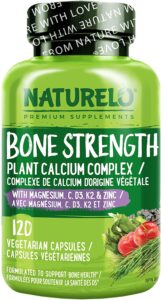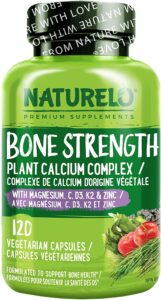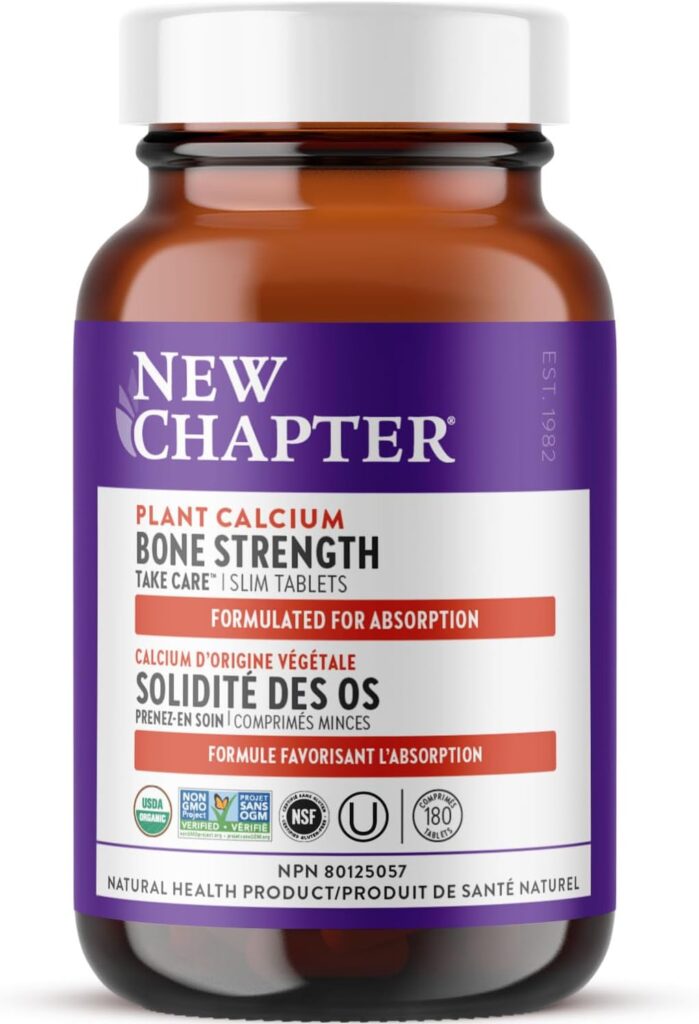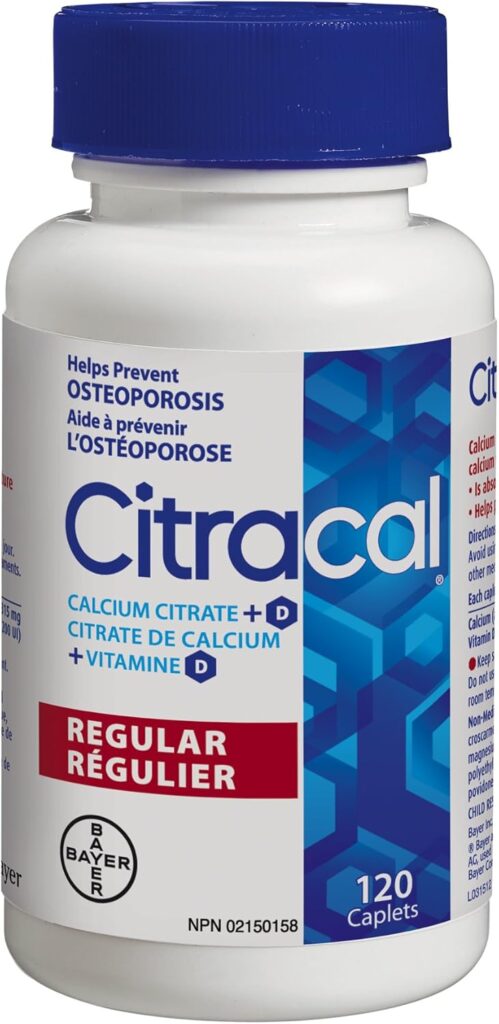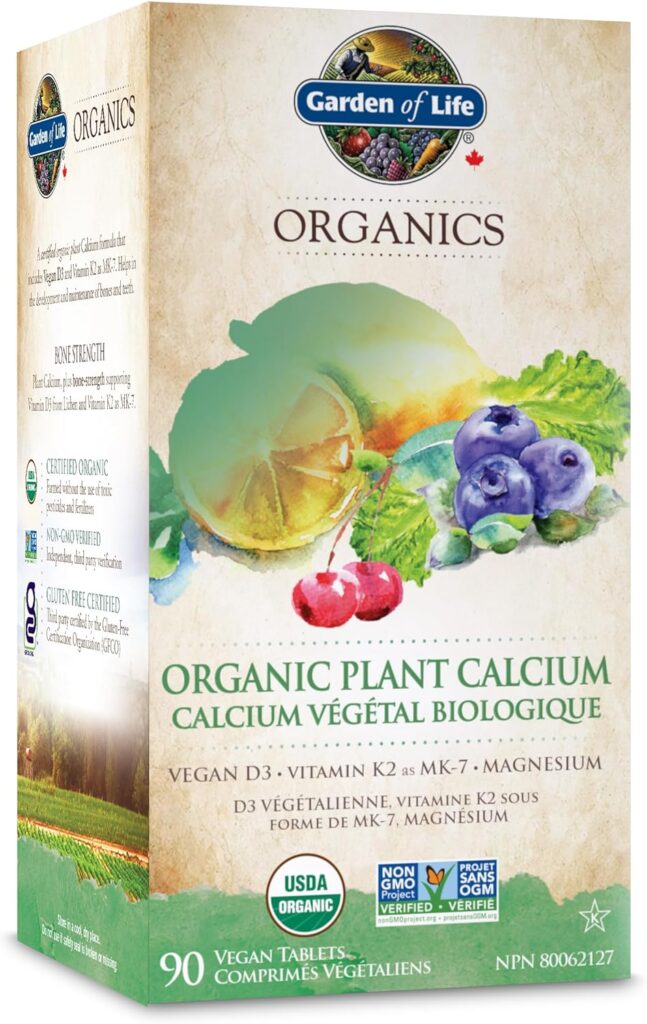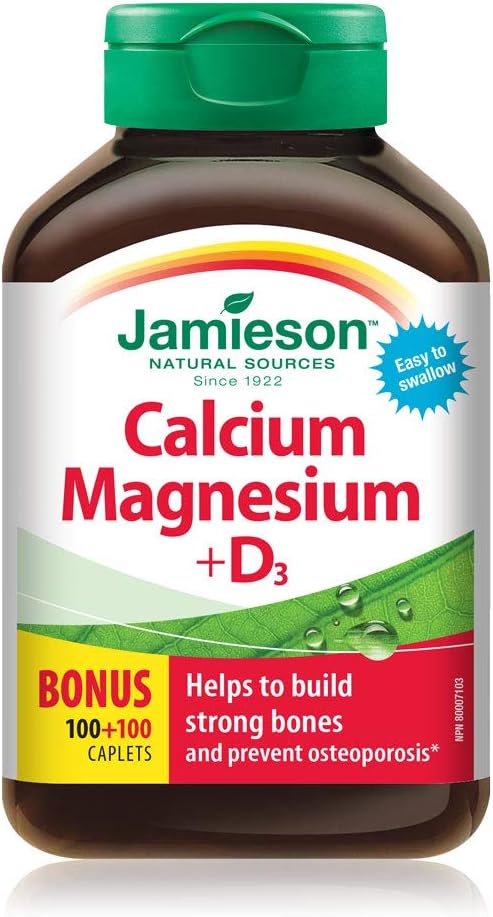Discover the best calcium for osteoporosis. Learn about top supplements, types of calcium, and how they can help strengthen bones and improve your overall bone health.
Did you know? Around 10 million Americans suffer from osteoporosis, making it a major public health concern! Osteoporosis weakens your bones, increasing the risk of fractures. Fortunately, you’ve probably heard that calcium can help.
I’ve spent a lot of time researching the best calcium for osteoporosis, and this article breaks it all down for you. We review calcium deficiency symptoms, the best form of calcium for osteoporosis, most effective calcium supplement, tips, and mistakes to avoid.
We also discuss the best time to take your supplements, the side effects of calcium supplements, personal lessons learned, and explore what works best to keep your bones strong and healthy.
Whether you’re managing osteoporosis or trying to prevent it, this down-to-earth guide on the best calcium for osteoporosis will give you the knowledge you need to make informed decisions.
What is Osteoporosis? Calcium and Bone Health
The word osteoporosis sounds scary, right? However it is used to explain your bones getting weaker because they lose density. And without that density, they are way more likely to break, even from small falls. Think of it like a tree trunk—if it’s hollow on the inside, it won’t take much to snap it in half.
Your body does not produce calcium, so you can only get it from your diet or supplements. Calcium is actually your bones’ best friend. You probably already know that it is what makes your bones strong, but did you know that around 99% of the calcium in your body is stored in your bones and teeth? This is like the body’s secret stash!
When your body does not get enough calcium for its daily activites, it “borrows” from that stash, eventually weakening your bones over time. And if you have osteoporosis or you are at risk for it, this borrowing can become a huge problem!
When I learned that osteoporosis affects millions of people, especially women over 50 ( 1 in 3 women will experience an osteoporosis-related fracture!), I knew I had to take action because I discovered that it is not just drinking the occassional glass of milk. There is so much more to it than that!
Calcium Deficiency Symptoms
Unfortunately, you might not even know you are low on calcium until things start going south. So, what are calcium deficiency symptoms? For me, it was random muscle cramps, and I’m talking the kind of cramps that wake you up in the middle of the night (super fun, right?).
I also noticed my nails were brittle, which seemed weird at the time but now makes sense. Low calcium isn’t just a bone thing—your body will find ways to let you know it’s not happy.
This can be especially tough if you’ve got osteoporosis since your bones are already struggling. Calcium can help slow down the bone loss, but you’ve got to stay consistent. You can’t just take a supplement for a few days and expect magic results. Trust me, I’ve experienced this personally!
Here’s a pro tip: You need calcium and vitamin D for bone health and proper absorbtion of calcium. Without vitamin D, taking calcium is like trying to fill a leaky bucket—most of it just goes to waste.
So, if you are serious about upping your calcium game, make sure you’re getting enough vitamin D too! Of course that can be tricky if you live somewhere without much sun, which is where taking supplements come in.
Best Calcium for Osteoporosis
Walking down the supplement aisle looking for calcium can be overwhelming. There can be up to 15 different types staring back at me—calcium carbonate, calcium citrate, calcium gluconate, and then some!
I had no idea what the difference was, and which was the best type of calcium for osteoporosis. Of course, I just grabbed the first bottle that looked good. Spoiler: it wasn’t the right one for me!
So, here’s the breakdown.
Calcium Carbonate vs Calcium Citrate
Calcium carbonate is the most common and the cheapest. It is found in things like antacids (Tums), and it’s great if you don’t have any digestive issues. But here’s the catch: you need to take it with food because it needs stomach acid to break down properly.
I made the mistake of taking it on an empty stomach, and guess what? No dice. My body wasn’t absorbing it, so I was basically just wasting my money. Big lesson learned!
Calcium citrate, on the other hand, is easier on the stomach and doesn’t need food to be absorbed. It’s a great choice if you’ve got digestive issues or if you are taking certain medications. I switched to this after my little mishap, and it worked way better for me. This seems to be the most effective calcium supplement.
Other Forms of Calcium
There are also other forms, like calcium lactate and calcium gluconate, but these are usually found in more specialized supplements or are recommended for people with specific medical needs. They are not as common, but if you’ve tried the big two and they didn’t work for you, these might be worth a shot. Definitely consult your healthcare professional on this.
Plant-Based Calcium vs Animal-Derived
This is an important one, especially if you’re vegan or lactose intolerant. Plant-based calcium is derived from things like algae, and is a great option if you are avoiding animal products.
Plus, plant-based options are usually easier on your digestive system. My cousin, who’s vegan, professes by plant-based calcium, and honestly, she has no issues with bone health. I tried it once, but it did not sit as well with me—again, it’s all about finding what works for you.
How to Choose the Best Form of Calcium for Osteoporosis for You
So, now that we have covered the types, let’s talk about how to actually select the best calcium supplement for osteoporosis that will work for you. While this may appear to be an overwhelming decision, it is simpler than it seems once you know what to look for.
Calcium Supplement Dosage and Absorption Issues
It is worth noting that more calcium is not always better. I made the mistake of thinking that a higher dose meant faster results, but it does not work that way.
Your body can only absorb so much calcium at once (about 500 mg), so if you are taking a huge dose, your body will just flush the extra out. Not exactly what you want after shelling out money for supplements. Start with a moderate dose and spread it out throughout the day – read the product label!.
Additional Nutrients
Another thing to consider is the other stuff packed in with your calcium. You want something with vitamin D because it helps your body absorb calcium. Some supplements also include magnesium, which is another key player in bone health.
Personally, I found a combo supplement with calcium, vitamin D, and magnesium that worked like a charm for me. It’s like a bone health trifecta, and it saved me from having to pop multiple pills.
Best Time to Take Calcium Supplements
Let’s talk about the best time to take calcium supplements. Some people champion taking calcium in the morning, others before bed. I tried both. Turns out, for me, taking it with breakfast worked best, especially since I went with calcium carbonate for a while and needed the food for better absorption. Plus, taking it at night did not sit well with my stomach.
Avoid These Mistakes
Quick tip: Do not take calcium with certain foods or drinks, like coffee or high-iron meals. I used to take my supplement with my morning coffee (big mistake), and it totally messed with the absorption. Stick to water, and if you are having a big meal with iron-rich foods (like steak), wait a couple of hours before taking your calcium.
5 Best Calcium Supplements for Osteoporosis in 2024
Now for recommendations! After a whole lot of trial and error (and a bunch of research), here are the top five calcium supplements found on Amazon.ca that are perfect for osteoporosis:
NATURELO Bone Strength – Plant-Based Calcium
Key Features: Plant-based and features raw calcium from marine algae, vitamin C from organic Acerola Cherries, plant-sourced vitamin D3 from lichen.
Why It’s Great: Better Absorption and includes 9 co-factors that enhance calcium absorption – Mg, Zinc, Mn, Bo, Si, and, vitamins C, D3, & K2. This is a solid, no-nonsense option which I tried when just starting out.
New Chapter Calcium Supplement
Key Features: Plant-based calcium, includes vitamin K2, D3, and magnesium.
Why It’s Great: This is perfect if you want a more holistic supplement. It’s gentle on the stomach, and the added vitamin K2 helps direct calcium to your bones (rather than hanging out in your arteries).
Citracal Slow Release Calcium Citrate
Key Features: Slow-release formula which includes D3.
Why It’s Great: I love the slow-release aspect because it means your body absorbs calcium gradually throughout the day. No more big doses that go to waste. Plus, the D3 makes sure everything gets absorbed nicely.
Garden of Life Organic Plant Calcium and Bone Health
Key Features: Organic, plant-based, includes D3, magnesium, and K2.
Why It’s Great: If you’re looking for a cleaner, more natural option, this is it. It’s certified organic, and the magnesium and K2 combo is great for maximizing bone health. Plus, it’s vegan-friendly.
Jamieson Calcium Magnesium with Vitamin D3
Key Features: Combines calcium, magnesium, and D3.
Why It’s Great: This one is a bit of a powerhouse with all three key nutrients. I found it to be super convenient since you’re hitting all the big nutrients for bone health in one go – excluding potassium. It is also economical , so no need to break the bank.
Lifestyle Changes to Support Bone Health Alongside Calcium
You may be taking calcium supplements now, or maybe you’re loading up on calcium-rich foods and that’s a great start, but calcium alone won’t magically solve everything. I learned this the hard way.
There is a lifestyle component to osteoporosis that I didn’t take seriously at first. You’ve got to pair that calcium intake with some key lifestyle changes if you really want to boost your bone health.
Exercise for Stronger Bones
Get this straight: your bones need exercise. When I first started thinking about osteoporosis, I figured exercise was more about keeping muscles strong, but turns out, it’s even more important for your bones!
I used to skip weight-bearing exercises because I thought walking was enough. Wrong. Weight-bearing and resistance exercises are essential for maintaining bone density. It’s like giving your bones a workout so they stay strong and healthy.
Weight-Bearing Exercises
The best part? You don’t have to become a gym rat to see benefits. Simple activities like walking, dancing, or even climbing stairs can make a big difference. I started with brisk walks, just 30 minutes a day, and over time, I added light weights.
Let me tell you—after a few weeks of consistent effort, I felt stronger. You don’t need to be bench-pressing a ton of weight, either; small dumbbells or resistance bands work great for building bone strength. Just get those bones moving!
Yoga and Bone Health
I never thought of yoga as a bone-strengthening exercise, but the balance and flexibility work is fantastic for your bones, especially if you’ve already got osteoporosis. I started with gentle poses, focusing on stability and posture.
Trust me, when you’re holding a pose like Warrior for longer than you’re used to, you feel it in your bones (in a good way!). It’s not about being a yoga pro. Rather, it is about challenging your bones and keeping them engaged.
Diet Changes for Optimal Bone Health
So, we all know calcium is important, but did you know that what you eat can make a huge difference in how well your body absorbs and uses that calcium? I was guilty of grabbing a calcium supplement and calling it a day. But it turns out your diet plays a big role too. My diet used to be pretty random, and I wasn’t focusing on calcium-rich foods—big mistake.
Foods Rich in Calcium
Adding calcium-rich foods to your diet is easier than you think. Dairy products are an obvious choice—cheese, milk, and yogurt are all solid options.
But if you’re like me and you get tired of dairy pretty quickly, there are other great sources, like leafy greens (hello, kale!), almonds, and even some types of fish, like sardines and salmon. I started incorporating more of these into my meals, and not only did I feel healthier, but I also felt my bones were getting stronger. Now, I make sure to check in with my doctor regularly, and it has made a world of difference.
Other Nutrients that Boost Calcium Absorption
Now, here’s where I was messing up. You can’t just eat calcium-rich foods or take supplements and call it good. Your body needs help absorbing that calcium, and that’s where other nutrients like magnesium and vitamin K2 come into play.
I wasn’t paying attention to magnesium for the longest time, but then I learned it’s essential for proper calcium absorption. Foods like spinach, pumpkin seeds, and black beans are loaded with magnesium, and I made it a point to add them to my meals.
Vitamin K2 is another big one—it helps direct calcium to your bones instead of letting it linger in your bloodstream (where it can cause issues). Foods like eggs, cheese, and fermented foods like sauerkraut are good sources of K2. I admit, I was a bit skeptical at first, but adding these into my diet made a noticeable difference in how I felt.
Managing Osteoporosis with a Holistic Approach
Here’s something that took me longer to realize than I’d like to admit: managing osteoporosis isn’t just about calcium or even exercise—it’s about the whole picture. You’ve got to think holistically if you really want to keep your bones in good shape .
When I first started focusing on my bone health, I did the whole supplement-only route. It wasn’t until I combined that with regular exercise and a well-balanced diet rich in bone-supporting nutrients that I started to see real progress.
Also, get regular check-ups. I avoided getting a bone density scan for a while because, honestly, I was a bit nervous about what it might show. But I finally went, and it gave me a clear picture of where I stood with my bone health. Now, I make sure to check in with my doctor regularly, and it has made a world of difference.
Conclusion – Best Calcium for Osteoporosis
Keeping your bones healthy is all about finding the right balance. Calcium plays a huge role, but it’s only part of the equation. You can decide to go with a calcium supplement, or focus on getting more from your diet along with regular exercise to give your bones the best chance to stay strong.
So, what’s your next move? Try one of the recommended best calcium for osteoporosis supplements or revamp your lifestyle to give your bones the best shot at staying strong!
Related Articles
- The Causes of Osteoporosis. Am I A High Risk?
- Foods That Are Good for Bone Health – Prevent Osteoporosis
- What is Osteopenia vs Osteoporosis? 4 Tips to Protect Bones
FAQS About The Best Calcium for Osteoporosis
What are the side effects of calcium supplements?
Calcium supplements can have side effects, especially if taken in high doses. Common effects include constipation, bloating, and gas. In some cases, excessive calcium intake may increase the risk of kidney stones or interfere with absorption of other essential minerals like iron and zinc. Stick to the recommended dosage and consult with your healthcare provider to avoid these issues. Taking calcium with food and ensuring you’re also getting enough vitamin D can help minimize side effects.
What is the best form of calcium for osteoporosis?
Calcium citrate and calcium carbonate are best for osteoporosis support.
References
Mayo Clinic (2022) Calcium and calcium supplements: Achieving the right balance https://www.mayoclinic.org/healthy-lifestyle/nutrition-and-healthy-eating/in-depth/calcium-supplements/art-20047097

